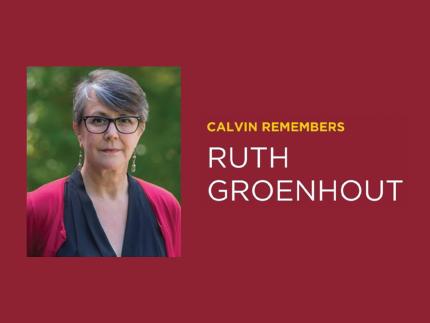Remembering Ruth Groenhout

Ruth Groenhout was a trailblazer. A few years after earning her Ph.D. in philosophy at the University of Notre Dame in 1993, she returned to her alma mater, Calvin University, to become its first female tenure-track philosophy professor.
“Part of her legacy will be as a leading female faculty member at the college,” said Kevin Timpe, philosophy department chair. “She served as both a mentor and an inspiration for numerous female faculty.”
Groenhout (’85) served at Calvin from 1996-2017 before being awarded a distinguished professorship in health-care ethics at the University of North Carolina, Charlotte. She died on Oct. 16, 2024, at the age of 61.
Groenhout’s research, which focused primarily on health-care ethics, ethics of care, and philosophy of gender, led to significant scholarly work and informed her teaching—all of which was woven together to help future generations confront the complexities of life.
“After hearing the news of her death, I was looking back over some of her books and was struck by Bioethics: A Reformed Look at Life and Death Choices (Faith Alive, 2009). It is so clear that this book developed out of her teaching experiences with the health-care ethics course that she created and championed,” said Timpe. “The book is a great example of the best of the intersection of faith, teaching, and scholarship at Calvin. Her work on the ethics of care deeply reflects who she was as a person and how much she gave of herself to others.”
Timpe said that while he worked as a colleague of Groenhout’s for only one year at Calvin, he deeply appreciated the way she led the department during that time.
“Ruth was one of those people that you . . . [were glad to know] was down the hall in case you needed anything. She was committed to working to bring about justice and had little patience for nonsense that would get in the way of that goal,” said Timpe. “Even now as department chair, I often find myself trying to channel her wisdom, her insight, and her poise.”
“She was a brilliant department chair, advocating for her colleagues on all fronts,” said Rebecca DeYoung, who benefited from being a colleague of Groenhout’s for two decades. “She was a leader. With Helen Sterk (former communications professor) and Janel Curry (former geography professor)—they were quite the trio of female leaders on campus during their time together at Calvin. Their investment in me personally and professionally shaped the rest of my career for the better.”
“She was a role model and mentor especially for young women at Calvin,” said DeYoung. “Some of our best students were inspired by her to go to graduate school in philosophy or engage in health care differently.”
Groenhout’s impact stretched well beyond her department. One example is her overhauling of health-care ethics, a course for nursing students and other pre-health majors, by collaborating with the nursing department and making the course more focused on justice and care.
“Ruth Groenhout was a leader in the Calvin University interdisciplinary writing group that created Transforming Care: A Christian Vision of Nursing Practice [Eerdmans, 2005],” said Mary Molewyk Doornbos, professor of nursing. “As we worked toward a clear articulation of how the Christian faith shapes and molds the discipline and practice of nursing, Ruth’s keen intellect and commitment to the project was evident in each discussion, debate, and writing task. Her insightful contributions around care theory have challenged Calvin nursing majors for two decades as they dig deep and thoughtfully consider the role that this central concept plays in their practice.”
While Groenhout is remembered as a remarkable scholar and teacher, her colleagues also say she was a great cook and avid gardener, loved to travel and sing, and loved spending time with her family and friends and walking her dog. They also say she was a vivacious lover of life and could be hilarious.
“I always appreciated how Ruth’s good humor and laughter punctuated her remarkable scholarly gifts,” said Doornbos.
“And Ruth had an infectious laugh that could brighten a room,” added Timpe.
Colleagues noted that while Groenhout’s legacy is woven into the community, there are also physical reminders that remain.
“I have a quilt made by her that reflects the architecture of the walls of the Calvin chapel, where she worshiped regularly. She described it as depicting the promise of Psalm 46—God as a refuge and fortress in times of need,” said DeYoung. “She gave it to me when I got my first cancer diagnosis. She was more than a colleague and mentor—she was a fiercely caring friend.”
“Calvin is a better place for Ruth’s role in our story,” said Timpe.


